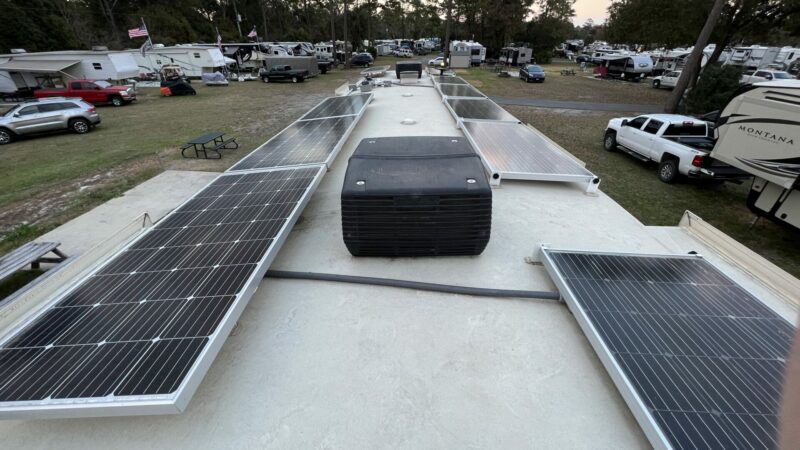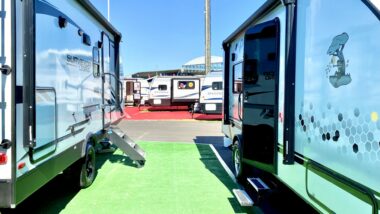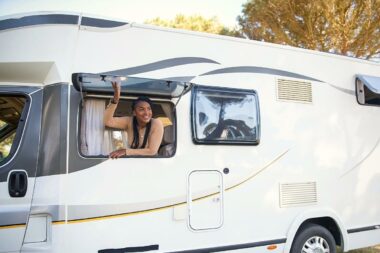Table of Contents Show
If you’re looking at solar power for your RV, it can feel a bit overwhelming at first. However, getting a good grasp of the basics doesn’t have to be complicated. This can help you ensure you select products and components for your system that do the job.
Today, we’re helping make solar power for RVs simple to understand. Let’s get started.
What Is Solar Power for RVs?
Solar power for RVs harness power from the sun to power an RV. This typically involves roof-mounted or portable solar panels. These panels charge an RV’s battery bank and allow RVers to run appliances in their RVs without connecting to another power source.
Keep in Mind: On a budget? Read this article and consider the cost before purchasing solar panels.
How Much Solar Power Is Needed for an RV?
The amount of solar power needed for an RV will depend on the RVers needs. Someone looking to run heavy-duty appliances like a microwave, coffee maker, or air conditioner is vastly different from someone who only needs the power to keep their battery charged for 12-volt lights and water pumps.
You should do an energy audit to determine the amount of solar you’ll need for your RV. You can do this by looking at the power requirements for the appliances in your RV and estimating how many times a day you use them and for how long. Coming up with a general idea for how much power you use in a day will determine how many solar panels you need.
It also helps you know how large a battery bank you might need.
Pro Tip: Hesitant to drill holes in your RV roof? A great option to test out your system is portable solar panels.
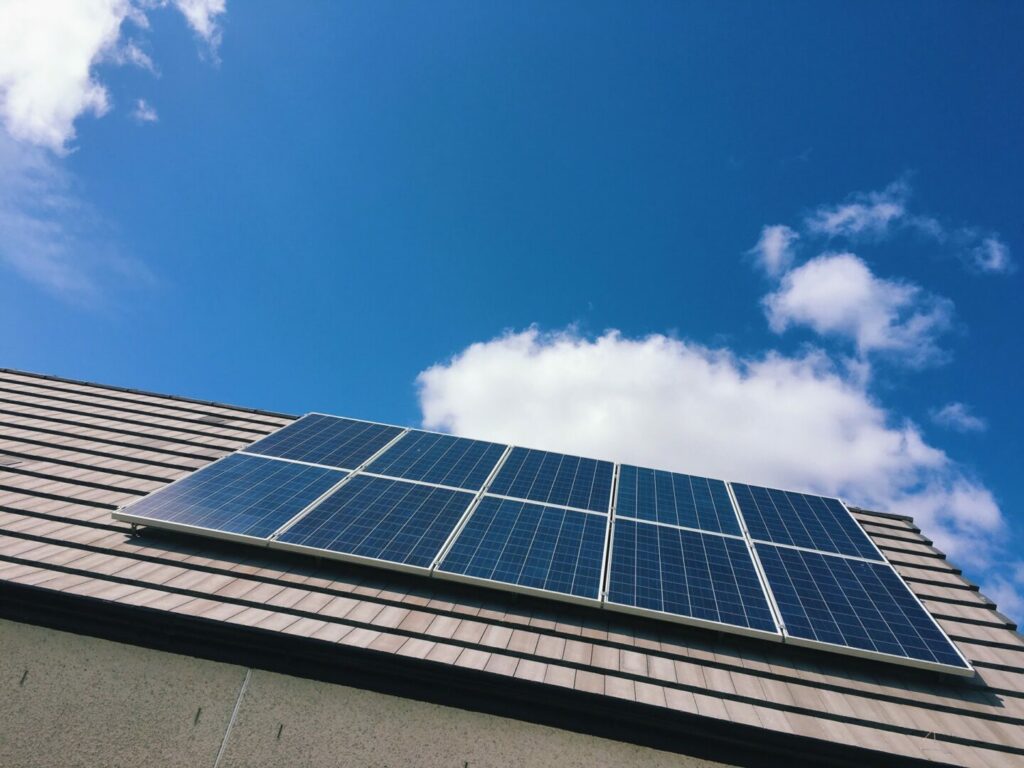
What Will 100 Watt Solar Panels Run in an RV?
A single 100W solar panel in an RV won’t run much. It will likely generate enough electricity to charge your small electronic devices like cell phones, laptops, and a lamp.
However, you’re not going to be powering items like heaters, TVs, or air conditioning units. A 100W solar panel is great for keeping your RV’s battery topped off when you aren’t using it.
Can You Run RV AC off Solar?
Yes, running an RV AC off of solar power is possible. However, it’s typically not a cost-effective option for many RVers. A typical RV AC uses approximately 100Ah per hour of use. This means if you have a 600Ah lithium battery bank, you can run your AC for about six hours before completely depleting your battery bank.
Considering that lithium batteries typically cost around $1,000 per 100Ah, you’re looking at roughly $6,000 in batteries. So it’s possible, but it’s just not going to be cheap.
If you want to run the AC at night to stay cool while you sleep, you may deplete your battery bank before the sun comes up. If that’s the case, you’re going to wake up to a dead battery bank and likely not have enough power to make your morning cup of coffee. You’ll have to wait for the sun to come up and start recharging your batteries.
If running your RV’s AC off solar is important to you, be ready to pay a pretty penny. Being able to run your RV’s AC as often as you like is going to cost quite a bit. You’re likely looking at a solar system that’s easily over $20,000, especially if you’re paying a professional to install it.
Due to the drastic expense, many RVers opt to use a generator or plug their RV into a power source to run their RV’s AC.
What Equipment Do I Need to Add Solar Power for an RV?
When it comes to solar power for an RV, there are a few pieces of necessary equipment you’ll need. Let’s take a look at what components you’ll need to start powering your RV with solar power.
Solar Panels
Solar panels use the sun’s rays to generate a flow of electricity. By increasing the number of solar panels, you increase electricity production. However, the placement of solar panels is also essential for maximum efficiency in solar panels.
Many RVers will mount their solar panels to their roofs using brackets to tilt their panels. This can drastically increase a solar system’s ability to generate electricity during the winter months or when parked in a location where the sun doesn’t get nearly as high in the sky.
Batteries
Battle Born Batteries offers a full line of lithium-ion batteries. Whether you simply want a drop-in replacement for your current battery or want a reliable off-grid system for some serious boondocking, they have you covered. We've used and abused our Battle Born Batteries for years and can confidently say lead is dead.
One of the most important aspects of a solar system is the battery bank. The types of batteries that make up an RV’s battery bank are also important. Standard RV batteries are lead-acid batteries prone to damage when discharged below 50%.
Many RVers upgrade to lithium batteries when getting a solar system due to lithium’s faster charging time, deeper depth of discharge, and lifespan.
You can have a rooftop full of solar panels, but an insufficient battery bank will likely leave you constantly feeling frustrated. There will be days when your solar panels can’t produce enough power to fill your battery bank. Having a generously-sized battery bank can help ensure you have enough power to weather a bad solar day or two.
Charge Controller
- SMART SOLAR CHARGE CONTROLLER: Solar charge the smart way with the Victron Energy SmartSolar MPPT charge controller, to...
- SPEED & EFFICIENCY: With lightning-fast optimum power point tracking and intelligent charge algorithms the Victron MPPT...
A charge controller helps prevent you from overcharging the batteries in your battery bank. The charge controller will regulate your solar panels’ voltage and current flow to your battery bank. The controller will monitor the status of your batteries and automatically adjust them to charge your batteries properly.
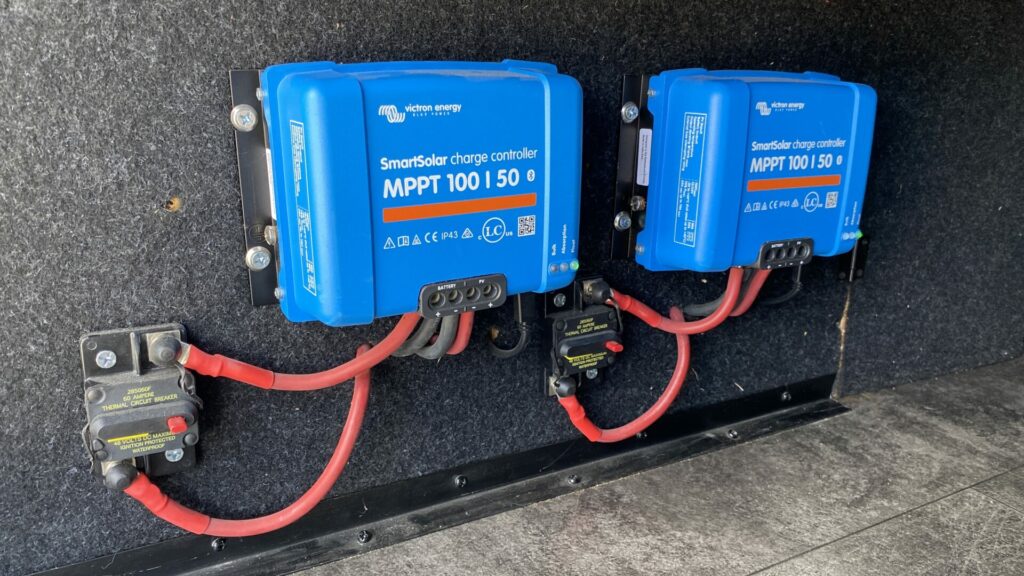
Inverter
- Let US do the programming for YOU! Custom Programmed Victron Energy 12V MultiPlus 3000 120V comes pre-programmed by...
- Our White Glove Programmers will work directly with you so that when you receive the inverter charger, it is ready for...
An inverter converts the 12-volt DC power to 120-volt AC power. This enables you to run appliances like TVs, coffee makers, and other items that require 120-volt power. You can have a solar power system without an inverter, but you’ll want one to get the maximum benefit of solar energy. It’s a must-have solar component if you’re planning to spend a significant amount of time off-grid.
SoftStart
If you want the ability to run your RV’s air conditioner off your solar power system, it’s essential to have a SoftStart. These pieces of equipment reduce the massive power draw needed when an air conditioner starts up.
Using a SoftStart can reduce the power needed for your AC unit no matter how long you’re planning to run it. You will overload most inverters if you run an AC without a SoftStart.
An added advantage is that a SoftStart also helps reduce the power needed to run an air conditioning unit, even when plugged into a power source. RVers with SoftStars on their AC units can often run multiple air conditioning units when connected to a 30-amp power source.
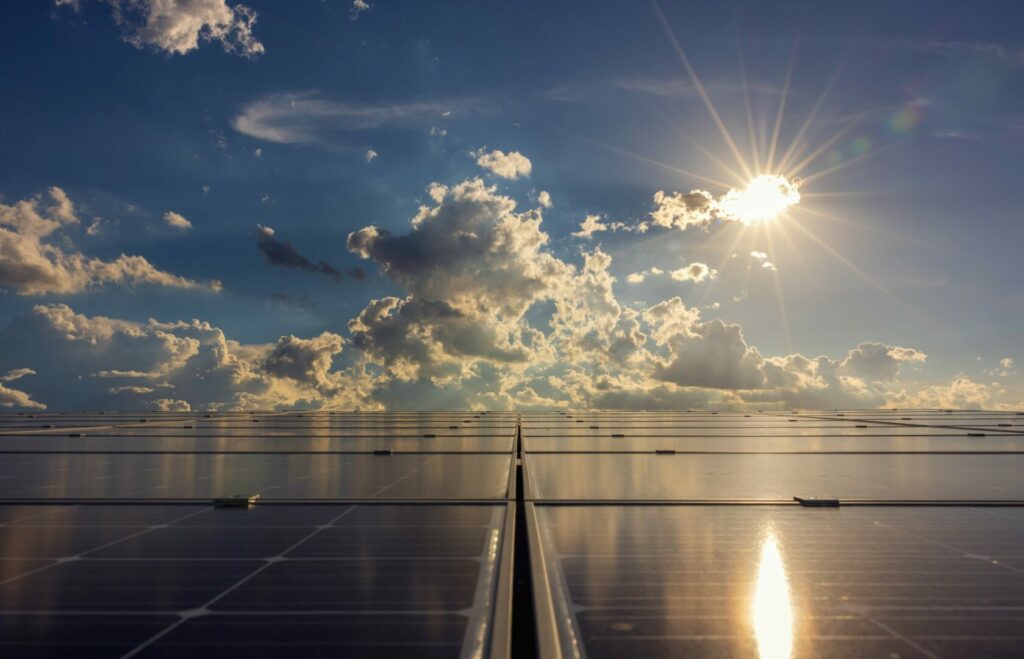
What Type of Solar Panel Is Best for an RV?
There are a variety of options when it comes to RV solar panels. The best option for you and your RV may not be the best option for other RVers. All factors considered, you’ll likely want to consider rigid monocrystalline panels.
These are the most reliable and durable panels and are great for boondocking. However, flexible solar panels that are semi-rigid monocrystalline are great options for curved roofs.
When looking at solar panels, the two most important things to consider are the size and warranty for the panels. A 200W solar panel produces twice the amount of a 100W panel but is only slightly larger. You only have so much space on your RV’s roof to place your panels. So get the best bang for your buck by making the most of every inch.
You want to have the assurance that if something does go wrong with a panel, there’s a warranty to cover it. We prefer Hightec Solar panels, which are 200W panels and come with a 25-year warranty. They’re high-quality solar panels, but they won’t break the bank when purchasing several for your RV.
What Type of RV Batteries Are Best to Store Solar Power?
The best type of RV battery for solar power can be a hot topic in the RV community. However, there’s little room for debate when looking at the data. Lithium batteries charge faster, last longer, and weigh less than other comparable RV batteries.
These simple facts make them the best options for solar power, but expect to pay a premium price to get exceptional results. Many RVers dismiss lithium batteries because of the increased costs. You can typically expect to pay roughly $1,000 per 100Ah for a high-quality lithium RV battery.
Our preferred RV battery for solar is Battle Born Batteries. They create some of the highest quality 12-volt and 24-volt deep cycle lithium batteries. They stand behind their products with a 10-year warranty and can help you select components for your solar power system that works together.
Pro Tip: If you want to learn more about the different lithium battery manufacturers and what makes them each unique, read How to Choose the Best Lithium RV Battery.
Is Solar on an RV Worth It?
Solar on an RV is most definitely worth it if you’ll use it. A solar power system can be a rather large investment, and you can recoup those costs by using it to camp in free spots. It may not be a good investment if you spend most of your time camping in established campgrounds.
A more cost-effective option may be to purchase a portable generator for use when you need it.
If you want the freedom of boondocking and RV use in some epic camping locations, solar on an RV can make that happen. Are you considering adding solar to your RV?
Last update on 2024-07-26 / Affiliate links / Images from Amazon Product Advertising API




